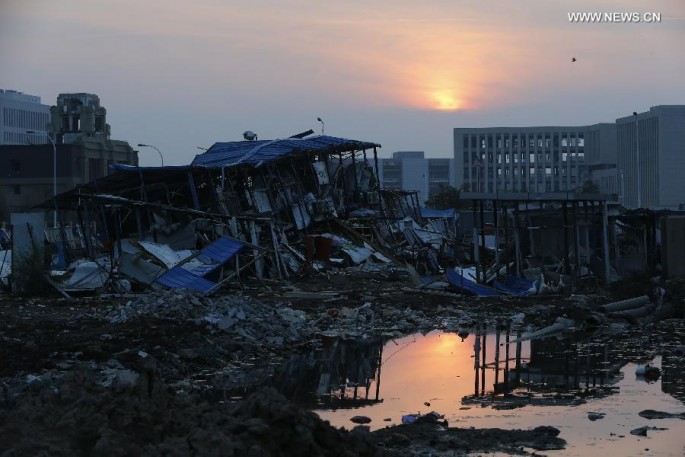Tianjin’s top executive has pledged to relocate the chemical plants in the city’s port area following last week’s deadly explosions.
All companies that produce and store dangerous chemicals are undergoing strict inspection and will be closed if any faults are found, Tianjin mayor Huang Xingguo said at a news conference on Wednesday.
The Aug. 12 explosions, which originated from a warehouse storing hazardous chemicals in Tianjin Binhai New Area, have claimed 117 lives, including 13 people still unidentified, and left 70 missing.
"As the principal leader of Tianjin, I have inescapable responsibility for the incident," said Huang, who met with the media for the first time a week after the blasts.
Huang said that the chemical plants will be moved to the Nangang Industrial Zone, 25 kilometers from the center of Binhai New Area, according to the city's development plan.
The warehouse, which is owned by Ruihai International Logistics, one of the three companies approved to store dangerous chemicals in Tianjin's port area, was located less than a kilometer from several residential compounds.
Ruihai International Logistics acquired the license to store and transport dangerous chemicals in June, Zong Guoying, a senior top official of Tianjin Binhai New Area, told China Daily on Thursday.
However, whether the location of the warehouse violated city planning and work safety laws will be answered by the final report of the State Council investigation group, said He Shushan, deputy major of Tianjin in charge of work safety.
According to Zong, Ruihai is owned by Yu Xuewei, the former executive at the state-run Binhai Logistics Co., and Dong Shexuan, the son of a former Tianjin police chief. Both have been detained by police.
As for the 17,000 homes destroyed by the blasts, of which several have demanded the government for compensation, Zong said that the government had set up a work center to solve the problems.
"The degree of impact varies from apartment to apartment," Zong said. "If it needs to be torn down, we will tear it down. If we should build new apartments to locate the residents, we will relocate them. We will compensate according to law."
Huang said that there will be no major impact on commodities exports in Tianjin despite the fact that 176 businesses have been affected by the blasts.
"I understand that many companies are facing difficulties at the moment and they might think of moving out, but I believe that the difficulties will be temporary and risks can be solved," he said. "Tianjin still has the opportunity to develop, and these companies have the vision."
Companies that are having difficulty obtaining compensation from insurance companies can also look to the government for assistance and support, said Zong.
"They should trust the government. The government has the capacity," he added.
Wen Wurui, head of Tianjin's environmental protection bureau, said that the incident has had a negative impact on the environment to a certain extent, but will not significantly influence human health, according to data collected from air and water samples in the area.
Wen also dismissed rumors of nerve gas being found at the blast epicenter, saying that no such chemicals have been detected in the area.
As for the disposal of dangerous chemicals remaining at the blast site, Wen said that nearly 200 experts and soldiers are working with the owners of the substances in identifying and transferring the remaining chemicals.
Most of the chemicals, including the highly toxic sodium cyanide, scattered on the ground has been cleared, although there are still some remaining in containers, according to the bureau.
"For safety reasons, the team can't work when it rains and during the night. And there is a great variety of chemicals and the placement is very complicated," Wen said. "We can't say when the cleanup work in the blast center will be finished."



























